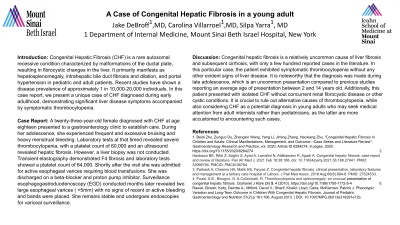Sunday Poster Session
Category: Liver
P1088 - A Case of Congenital Hepatic Fibrosis in a Young Adult
Sunday, October 22, 2023
3:30 PM - 7:00 PM PT
Location: Exhibit Hall

Has Audio
- JD
Jake Debroff, MD
Mount Sinai Beth Israel
New York, NY
Presenting Author(s)
Jake Debroff, MD1, Silpa Yarra, MD1, Carolina Villarroel, MD2
1Mount Sinai Beth Israel, New York, NY; 2Mount Sinai Beth Israel Hospital, New York, NY
Introduction: Congenital Hepatic Fibrosis (CHF) is a rare autosomal recessive condition characterized by malformations of the ductal plate, resulting in fibrocystic changes in the liver. It primarily manifests as hepatosplenomegaly, intrahepatic bile duct fibrosis and dilation, and portal hypertension in pediatric and adult patients. Recent studies have shown a disease prevalence of approximately 1 in 10,000-20,000 individuals. In this case report, we present a unique case of CHF diagnosed during early adulthood, demonstrating significant liver disease symptoms accompanied by symptomatic thrombocytopenia.
Case Description/Methods: A twenty-three-year-old female diagnosed with congenital hepatic fibrosis at eighteen presented to a gastroenterology clinic to establish care. During her adolescence, she experienced frequent and excessive bruising and heavy menstrual bleeding. Laboratory tests at that timed revealed severe thrombocytopenia, with a platelet count of 60,000 and an ultrasound revealed hepatic fibrosis. However, a liver biopsy was not conducted. Transient elastography in 2019 demonstrated F4 fibrosis and laboratory tests showed a platelet count of 64,000. Shortly after the visit she was admitted for active esophageal varices requiring blood transfusion. She was discharged on a beta-blocker and proton pump inhibitors. Surveillance esophagogastroduodenoscopy (EGD) conducted months later revealed two large esophageal varices ( >5mm) with no signs of recent or active bleeding and bands were placed. She remains stable and undergoes endoscopies for variceal surveillance.
Discussion: Congenital hepatic fibrosis (CHF) is a relatively uncommon cause of liver fibrosis and subsequent cirrhosis, with only a few hundred reported cases in the literature. In this particular case, the patient exhibited symptomatic thrombocytopenia without any other evident signs of liver disease. It is noteworthy that the diagnosis was made during late adolescence, which is an uncommon presentation compared to previous studies reporting an average age of presentation between 2 and 14 years old. Additionally, this patient presented with isolated CHF without concurrent renal fibrocystic disease or other cystic conditions. It is crucial to rule out alternative causes of thrombocytopenia, while also considering CHF as a potential diagnosis in young adults who may seek medical attention from adult internists rather than pediatricians, as the latter are more accustomed to encountering such cases.
Disclosures:
Jake Debroff, MD1, Silpa Yarra, MD1, Carolina Villarroel, MD2. P1088 - A Case of Congenital Hepatic Fibrosis in a Young Adult, ACG 2023 Annual Scientific Meeting Abstracts. Vancouver, BC, Canada: American College of Gastroenterology.
1Mount Sinai Beth Israel, New York, NY; 2Mount Sinai Beth Israel Hospital, New York, NY
Introduction: Congenital Hepatic Fibrosis (CHF) is a rare autosomal recessive condition characterized by malformations of the ductal plate, resulting in fibrocystic changes in the liver. It primarily manifests as hepatosplenomegaly, intrahepatic bile duct fibrosis and dilation, and portal hypertension in pediatric and adult patients. Recent studies have shown a disease prevalence of approximately 1 in 10,000-20,000 individuals. In this case report, we present a unique case of CHF diagnosed during early adulthood, demonstrating significant liver disease symptoms accompanied by symptomatic thrombocytopenia.
Case Description/Methods: A twenty-three-year-old female diagnosed with congenital hepatic fibrosis at eighteen presented to a gastroenterology clinic to establish care. During her adolescence, she experienced frequent and excessive bruising and heavy menstrual bleeding. Laboratory tests at that timed revealed severe thrombocytopenia, with a platelet count of 60,000 and an ultrasound revealed hepatic fibrosis. However, a liver biopsy was not conducted. Transient elastography in 2019 demonstrated F4 fibrosis and laboratory tests showed a platelet count of 64,000. Shortly after the visit she was admitted for active esophageal varices requiring blood transfusion. She was discharged on a beta-blocker and proton pump inhibitors. Surveillance esophagogastroduodenoscopy (EGD) conducted months later revealed two large esophageal varices ( >5mm) with no signs of recent or active bleeding and bands were placed. She remains stable and undergoes endoscopies for variceal surveillance.
Discussion: Congenital hepatic fibrosis (CHF) is a relatively uncommon cause of liver fibrosis and subsequent cirrhosis, with only a few hundred reported cases in the literature. In this particular case, the patient exhibited symptomatic thrombocytopenia without any other evident signs of liver disease. It is noteworthy that the diagnosis was made during late adolescence, which is an uncommon presentation compared to previous studies reporting an average age of presentation between 2 and 14 years old. Additionally, this patient presented with isolated CHF without concurrent renal fibrocystic disease or other cystic conditions. It is crucial to rule out alternative causes of thrombocytopenia, while also considering CHF as a potential diagnosis in young adults who may seek medical attention from adult internists rather than pediatricians, as the latter are more accustomed to encountering such cases.
Disclosures:
Jake Debroff indicated no relevant financial relationships.
Silpa Yarra indicated no relevant financial relationships.
Carolina Villarroel indicated no relevant financial relationships.
Jake Debroff, MD1, Silpa Yarra, MD1, Carolina Villarroel, MD2. P1088 - A Case of Congenital Hepatic Fibrosis in a Young Adult, ACG 2023 Annual Scientific Meeting Abstracts. Vancouver, BC, Canada: American College of Gastroenterology.
